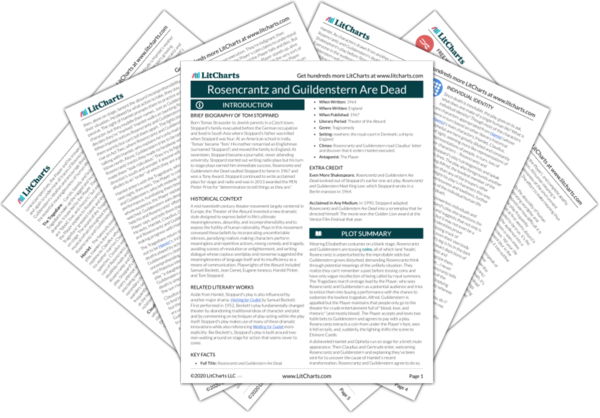Death
The odds of the coin toss that opens Act One – an 100-long streak of "heads" – at first seem impossible, the sure sign of a make-believe world. Yet, as the play goes on, it becomes clear that there's nothing really odd about those odds: they represent the probability of human life. Death wins every time. "Life is a gamble, at terrible odds" the Player explains, "—if it was a bet you wouldn't take it."…
read analysis of DeathIndividual Identity
Since death is inevitable, the play goes on to ask, what does one make of a single human life? What is individual identity? Though most of the characters in the play are characters appropriated from Hamlet (whose characters were in turn based on other literary historical characters), Hamlet's main characters (Hamlet, Claudius, Horatio, and Ophelia) are here greatly diluted and constantly fade in and out of sight, seeming more like representations of ghosts than…
read analysis of Individual IdentityFree Will
As the play questions the reality of individual identity, it likewise questions free will. What is it? What is choice? What is action or progress? Can one trust all the trappings and signs of existence if one knows that they'll soon be extinguished? As the play proceeds, individual decisions and actions seem more and more inconsequential, nearly equivalent to apathy and passivity. Hamlet is, famously, a play whose crisis swirls within the vortex of Hamlet's…
read analysis of Free Will
The Absurdity of the World
As a play investigating the central, unknowable mysteries of existence – death and mortal beings' capacity for free will – Rosencrantz and Guildenstern Are Dead charts the human struggle to make sense of a universe characterized by utter randomness, harshness towards human life (the universe itself could be seen as the dramatic "bloodbath" described by the Player), and complete apathy towards the human condition. All human meaning is undermined by the meaninglessness of the environment…
read analysis of The Absurdity of the WorldThe Theater
As a play written within the structure of another play (Shakespeare's Hamlet), Rosencrantz and Guildenstern Are Dead offers a complex meditation on the nature of the theater and the relationship between drama and lived human life. The play articulates a wide range of views on the theater, from a harsh critique of theater's artifice and inability to represent death (articulated by Guildenstern) to an unreflective willingness to embrace dramatic entertainment as diversion from life…
read analysis of The Theater






